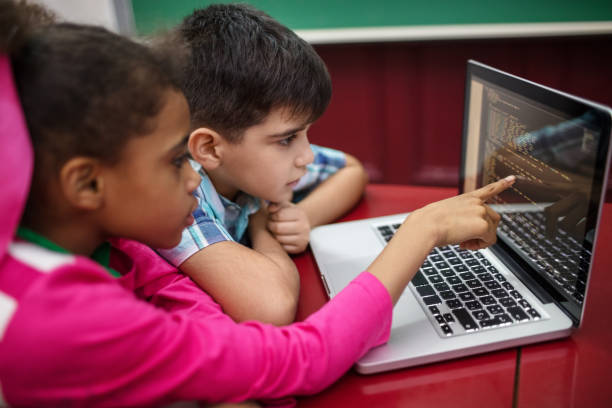Children Start Learning to Code has emerged as a fundamental skill, akin to reading and mathematics. As technology continues to advance, many parents and educators are eager to introduce coding to children from a young age. But how early can kids realistically start learning to code? This guide delves into the appropriate ages for coding education, the advantages of starting early, and effective methods for introducing programming to young learners.
Understanding Coding for Children

What is Coding?
Coding, or programming, involves writing instructions that computers can execute. It utilizes various programming languages to create software, websites, games, and more. By learning to code, children develop essential skills in logical thinking, problem-solving, and creativity.
Why Teach Kids to Code?
- Problem-Solving Skills: Coding encourages children to break down complex problems into smaller, manageable parts.
- Creativity: It fosters creative expression, enabling kids to design games, animations, and applications.
- Career Opportunities: As technology evolves, coding skills are increasingly valuable in the job market.
- Logical Thinking: Coding enhances logical reasoning, which can benefit various academic subjects.
When to Start Learning to Code
Early Exposure: Ages 5-7
Children can begin exploring basic coding concepts as early as five. At this age, learning is often game-based and involves visual programming languages.
Tools and Resources
- ScratchJr: This platform introduces coding concepts through simple programming using visual blocks, perfect for younger children.
- Code.org: Offers engaging games and activities that teach foundational coding skills in a fun way.
Building Foundations: Ages 8-10
From ages eight to ten, children can grasp more complex ideas and start learning basic programming languages.
Recommended Programming Languages
- Scratch: Building on earlier experiences, kids can create interactive stories and games using Scratch.
- Blockly: Similar to Scratch, Blockly employs block-based coding while providing a pathway to text-based programming.
Intermediate Skills: Ages 11-13
By this age, children are ready to tackle more advanced programming languages and concepts, including algorithms and data structures.
Suitable Programming Languages
- Python: Renowned for its simplicity and readability, Python is an excellent choice for beginners, allowing them to focus on programming concepts without being overwhelmed by syntax.
- JavaScript: Ideal for those interested in web development, JavaScript enables kids to build interactive websites and applications.
Advanced Learning: Ages 14 and Up
As teenagers, students can dive into advanced programming topics, software development, and real-world projects.
Potential Areas of Focus
- App Development: Creating applications for mobile devices can be a thrilling endeavor for teens.
- Game Development: Exploring game engines like Unity or Unreal Engine allows them to design and build their own games.
Advantages of Early Coding Education
Fostering a Growth Mindset
Learning to code promotes a growth mindset, teaching children that challenges can be overcome with effort and perseverance. They learn to approach problems systematically, which enhances their resilience.
Improving Academic Performance
Research indicates that children who learn to code often excel in other subjects, particularly math and science. Coding reinforces logical reasoning, which translates into better problem-solving abilities across various academic disciplines.
Promoting Teamwork and Collaboration
Many coding projects require teamwork. By collaborating, children learn the importance of communication, compromise, and cooperation—skills that are vital for future academic and professional success.
Effective Methods to Introduce Coding
Interactive Coding Games
Engaging games can make coding fun and accessible. Platforms like CodeCombat and LightBot transform coding into an interactive adventure, motivating kids while they learn.
Coding Camps and Workshops
Numerous organizations offer coding camps and workshops tailored for children. These immersive experiences provide hands-on learning and often culminate in a project they can showcase.
Online Courses and Tutorials
Many online platforms provide coding courses specifically designed for children. Websites like Khan Academy and Codecademy offer structured lessons that guide kids through various programming languages at their own pace.
Involving Parents
Parents can significantly influence their children’s coding education. By participating in coding projects, helping with troubleshooting, and nurturing curiosity, parents can enhance their children’s learning experiences.
Real-World Projects
Encouraging children to work on practical projects deepens their understanding of coding. Whether it’s developing a simple website for a school assignment or creating a game, applying coding skills in real-life scenarios reinforces learning.
Challenges in Learning to Code
Frustration and Overwhelm
Learning to code can sometimes be frustrating, especially when kids face obstacles. Creating a supportive environment that encourages perseverance and problem-solving is essential.
Balancing Screen Time
While coding is a beneficial activity, it’s crucial to balance screen time with other forms of learning and play. Encouraging outdoor activities and offline hobbies contributes to a healthy lifestyle.
Success Stories: Inspiring Young Coders

Case Studies of Young Programmers
There are numerous inspiring examples of young coders who have made significant strides in the tech industry. Some have developed apps that solve real-world problems, while others have excelled in coding competitions at a young age.
Role Models in Tech
Highlighting successful figures in the tech industry who began coding as children can motivate young learners. Many renowned programmers and tech entrepreneurs started their coding journeys early in life.
Conclusion
In summary, children can start learning to code as early as five years old, with a range of age-appropriate resources and methods available to support their journey. The advantages of early coding education go beyond just technical skills, promoting creativity, problem-solving, and collaboration. By introducing coding engagingly and enjoyably, we can empower the next generation to excel in a technology-driven world. As they advance from basic concepts to more complex programming languages, the skills they develop will unlock future opportunities and career paths.
